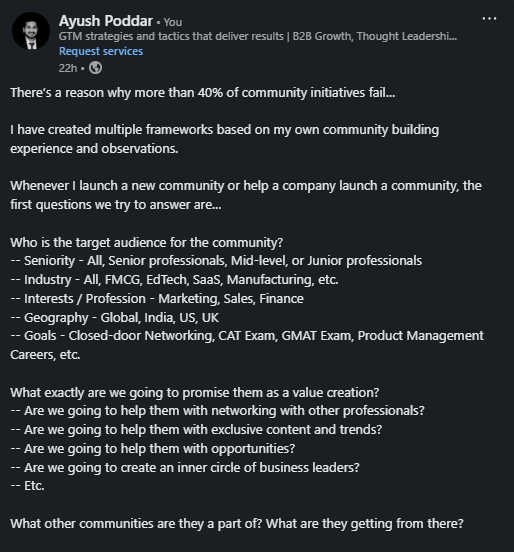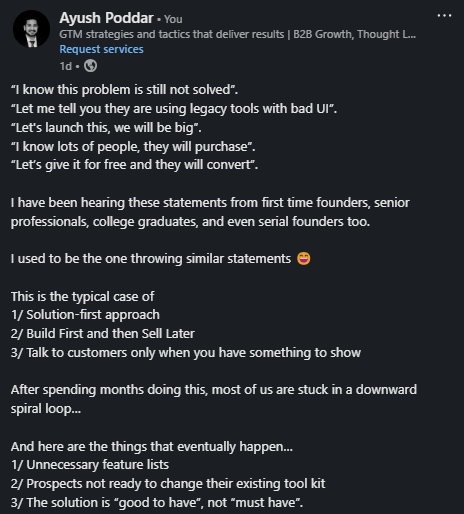Build your network for growth - A handbook for founder and solopreneur
This newsletter explains how a founder and a solopreneur can build a network for growth. It highlights the key strategies and tactics for an entrepreneur to build high quality connections.
Networking is often misunderstood as the more people you know, the better.
But here’s a truth most of us miss: It’s not about the number of connections—it’s about the depth and quality of those relationships.
Think of an entrepreneur who built a million-dollar business without ever attending a networking event. Instead, they focused on a few strategic and warm relationships that grew their business exponentially.
Today’s Goal: Shift your mindset from ‘networking for numbers’ to ‘networking for influence and growth.
Action:
1/ Identify ten people from your Linkedin / Whatsapp / Twitter Network who can genuinely help grow your business.
2/ Next 4 weeks, focus on nurturing the relationships.
Smaller, more intentional networks consistently outperform massive ones. A solopreneur who cultivated a small, high-value network saw exponential growth because they nurtured each relationship.
The more focused your connections, the deeper the ties, the bigger the impact on your entrepreneurial journey.
The Power of Your Network in Business Transactions - Equally important for Solopreneur
1/ Across industries—from consulting services to software products to goods and services—buyers consistently rely on referrals to make decisions.
Think about it: before making any major purchase, what do you do? You ask someone you trust for a recommendation. This pattern of behavior is even more critical in business.
For instance, McKinsey & Company, one of the world’s leading consulting firms in business strategy, heavily relies on its alumni network for client leads and recruitment.
Similarly, Elon Musk initially leveraged his personal network of Silicon Valley investors and influencers to gain traction and funding for Tesla
2/ Buyers prefer social proof over marketing claims. They want to hear from people they trust, whether directly or through a trusted connection.
Social proof and credibility often surpass price or product features in influencing decisions. A warm recommendation from a trusted source carries more weight than the best sales pitch or ad.
3/ People are four times more likely to buy when referred by a friend.
Slack’s early success is proof of this. They didn’t need a massive user base, just a tight-knit group of evangelists who loved the product and spread the word.
Action: Set a goal of reaching out to three high-value connections every month. Keep the relationships alive with meaningful interactions.
Tip: Always test your business idea and business plan with these high value connections once they are warm.
Real-World Insight: The Impact of Networking in Action
Over the last three years, I’ve seen firsthand how my network has provided a steady source of value:
→ When I need to transact—whether I’m buying, selling, or forming partnerships—I go to people I know, or friends of friends. This layer of trust simplifies every interaction.
For example, most of the co-marketing, social influencing collaborations, early stage vc investments come out of these relationships.
→ Whenever I run a giveaway or promotion, the first group I reach out to is my network. These are people who know my work and are more likely to engage, share, or participate.
For example, when I launched a free “GTM Brainstorming 1:1 Sessions” last year, I invited founders from my network to participate first. Within two weeks, I had my calendar full, all thanks to my immediate circle.
→ When sending out exclusive offers or referrals, I focus on the people I know, and they often return the favor. It’s a cyclical process of value exchange.
→ I’m always more inclined to explore potential partnerships with friends or their connections because we share a foundation of trust. It speeds up decision-making and reduces the friction typically found in new business deals.
Expert Suggestions for Building a Quality Network and Building a Business
Experts agree:
when it comes to networking, “quality over quantity.”
A massive list of superficial contacts won’t help you as much as a small group of meaningful connections. For an entrepreneur, his true worth is his network.
Here’s what the experts suggest:
1. Focus on Quality Over Quantity
It’s tempting to think that the more people you know, the better your chances of success. But this couldn’t be further from the truth. A small, tight-knit group of people who genuinely care about your success will always be more powerful than a vast network of superficial contacts. You need to qualify people before you allow them into your inner circle.
Ask yourself: can this person contribute to my growth, and how can I offer them value in return?
Take Reid Hoffman, co-founder of LinkedIn. He built his professional network based on a core group of high-quality connections, which eventually helped him form key partnerships with companies like PayPal and Greylock Partners.
Tim Ferriss, author of “The 4-Hour Workweek”, practices this by focusing on cultivating fewer, more impactful relationships that can help grow his brand.
2. Avoid a Transactional Mindset - Entrepreneurship over Selling
One of the biggest mistakes in networking is treating it like a transaction. If you’re only reaching out to people when you need something, your approach will feel insincere. The goal is to build relationships, not accumulate favors. Provide value to others without expecting anything in return. The benefits will come naturally over time.
For example, Gary Vaynerchuk emphasizes providing value first. He famously states, “If you’re asking for something before you’ve given value, you’ve already lost
Mistake: Many startup founders fall into the trap of attending networking events just to collect contacts. This is often ineffective, as connections made without genuine value exchange rarely bear fruit.
3. Build Trust - Others also viewed and experienced
At the heart of every great network is trust. But how do you build a trust network? It’s about consistent engagement, offering value, and building genuine relationships.
Consistent Engagement:
To build trust, you need to stay connected with your network regularly, not just when you need something. For example, consider Sara Blakely, the founder of Spanx. She makes it a habit to check in with her contacts periodically—whether it’s a quick coffee chat or a simple text message.
Offering Value:
Building trust also means offering value first. Instead of asking for favors, start by giving. This could be as simple as sharing a helpful resource, making a relevant introduction, or offering advice.
Building Genuine Relationships:
Finally, building a trust network means investing in genuine relationships. People can sense insincerity, so your interactions should come from a place of authenticity.
How to build a trust network for growth?
Building a trust-based network doesn’t happen overnight. For solopreneurs and startup founders, this is gonna be your support system and growth accelerator if done with patience and consistency.
It takes time, intention, and the right strategies. Here are some things I follow to foster meaningful connections with founders, entrepreneurs and business leaders (and I don’t do these daily—consistency is key, not frequency):
1/ Have casual chats or coffee conversations periodically
It doesn’t need to be a formal meeting. A relaxed chat over coffee can strengthen your relationships. These small moments of connection often lead to big opportunities down the line.
2/ Never spam the folks you know
Over-communicating can be just as bad as under-communicating. Don’t bombard your network with irrelevant updates or requests. Keep your interactions meaningful and considerate.
3/ Use schedulers to send value-creating messages every 3-4 weeks
Aside from casual conversations, I make sure to send out valuable content periodically. This could be industry insights, helpful articles, or introductions. The key is to stay on their radar without overwhelming them.
4/ Maintain a personal CRM
Using tools like Google Sheets or Notion, I map out my network. It’s impossible to remember everything about everyone, so a personal CRM helps keep track of conversations, follow-ups, and key relationships. This way, I never miss anything, even with a large network.
- Automate Reminders and Conversation Pointers through note taking, meeting recording and voice recording.
5/ Offer value before asking for favors - Recommended by Linkedin
Whenever I meet someone new or reconnect with someone in my network, my first thought is: how can I help them? Whether it’s sharing resources, making introductions, or offering advice, I focus on contributing to their success before I ask for anything in return.
6/ Set aside time each week to engage with your network
Networking isn’t a one-time activity. It requires consistent effort.
Actionable - Dedicate time each week to check in with people, share resources, or just catch up.
This habit will help you maintain strong ties and ensure that your network remains active.
7/ Frequently asked questions
Here are five frequently asked questions you can should ask yourself everytime you focus on connecting with new people or warming existing connections...
1. Am I providing value before asking for something?
When networking, always start by offering help, resources, or introductions before expecting anything in return. This builds trust and makes future asks feel more natural.
2. How consistent am I in engaging with my network?
Regular touchpoints, like casual catch-ups or value-driven messages, keep your relationships warm and demonstrate your commitment to maintaining the connection.
3. Am I nurturing quality relationships or chasing quantity?
Focus on cultivating deep, meaningful relationships with a small group rather than trying to connect with everyone. Quality connections lead to stronger trust and better opportunities.
4. Am I approaching my network with genuine intent?
Ensure that your interactions are authentic and not driven by purely transactional goals. People can sense insincerity, and trust is built on genuine, long-term relationships.
5. Do I have a system in place to track and nurture relationships?
Use a personal CRM or tracking system to keep up with key contacts, conversations, and follow-ups, ensuring you maintain strong connections over time.
These questions will help you stay intentional and effective in building a trust network for growth.
A thriving solopreneur business or a large scale startup - What are you building a network for?
Think about your goals, and structure your networking efforts around them. But most importantly, always aim to contribute before you collect.
Whether you’re building a successful business, seeking new opportunities, collaborations, or just want to stay connected with industry peers,
“your network is your most valuable asset”.
Recommended from Medium :
"One time, I followed a recommendation from Medium for a blog from a thought leader in GTM. I connected with him on Linkedin. That single connection led to a newsletter collaboration that tripled my outreach."
Loved this post?
Featured Posts
There is a reason why more than 40% of community initiatives fail…
Validating Problem, not Solution
If you’re not a subscriber, here’s what you missed earlier:
Subscribe to get access to the latest marketing, strategy and go-to-market techniques . Follow me on Linkedin and Twitter.










